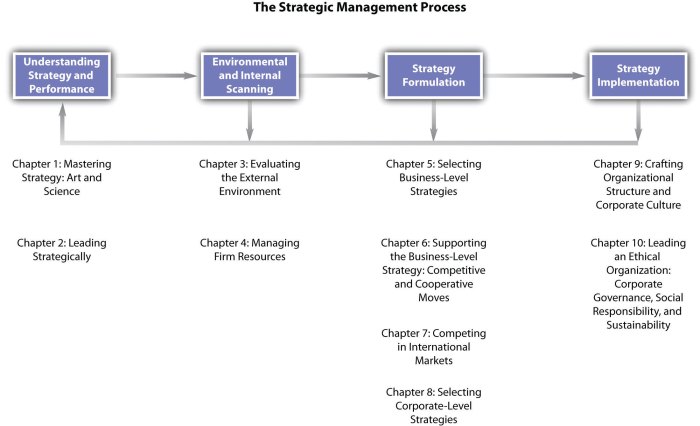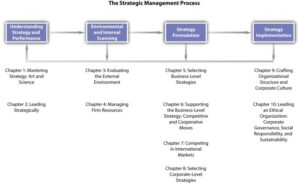
Strategic decision making serves as the backbone of successful organizations, shaping their future and guiding them through challenges and opportunities. This critical process involves analyzing data, evaluating options, and envisioning the long-term effects of choices that can propel a business forward or hinder its growth.
In today’s dynamic market environment, understanding the significance of strategic decision making is essential. Companies across various industries have thrived through well-informed decisions that align with their goals, showcasing the importance of innovation and adaptability in their approaches.
Strategic Decision Making Overview
Strategic decision making is crucial for organizations as it shapes the direction and success of the business. These decisions influence not only the company’s operations but also its long-term sustainability in an ever-changing market landscape.
Importance of Strategic Decision Making
Strategic decision making involves analyzing various factors and trends to make informed choices that drive organizational goals forward. Effective strategic decisions lead to competitive advantages, improved resource allocation, and increased overall performance. For instance, Apple Inc. made a strategic decision to diversify its product line, resulting in a significant increase in market share and profitability. On the other hand, Blockbuster’s failure to adapt to the digital streaming trend exemplifies the consequences of poor strategic decision making.
Challenges in Strategic Decision Making
Despite its importance, organizations often face challenges during the strategic decision-making process. These may include:
- Data Overload: With vast amounts of information available, it can be challenging to identify what is relevant.
- Bias: Personal biases can cloud judgment and lead to suboptimal decisions.
- Uncertainty: The unpredictable nature of markets can make it difficult to foresee the outcomes of decisions.
Business Innovation
Strategic decision making is a driving force behind business innovation, shaping how companies adapt and thrive in competitive environments.
Influence of Strategic Decision Making on Innovation
Innovative decisions often stem from a strategic analysis of market needs and gaps. Companies like Tesla have thrived by making bold strategic decisions that prioritize innovation over traditional approaches. This forward-thinking mindset has not only transformed their product offerings but has also set new industry standards.
Comparative Analysis of Decision-Making Processes
Traditional decision-making processes often rely on established practices and historical data. In contrast, innovative approaches encourage experimentation and agility. For example, Google employs a strategic decision-making model that embraces rapid prototyping, allowing them to pivot quickly based on user feedback and market trends.
International Business
Strategic decision making plays a vital role in navigating the complexities of international business operations.
Impact on Global Market Entry
When entering global markets, organizations must carefully evaluate numerous factors, such as cultural differences, regulatory environments, and competitive landscapes. Starbucks strategically tailored its offerings to local tastes when entering the Chinese market, leading to successful adoption and growth.
Key Factors Influencing International Decisions
Several factors shape strategic decisions in international business, including:
- Economic Conditions: Understanding the economic climate of target markets.
- Political Stability: Assessing the risks associated with political environments.
- Market Demand: Analyzing consumer preferences and trends.
Business Interviews
Evaluating strategic decision-making skills in job candidates is essential for organizations aiming to strengthen their leadership teams.
Framework for Conducting Interviews
A structured interview framework should focus on identifying key decision-making competencies. This can include past experiences, situational challenges, and the reasoning behind specific decisions.
Effective Interview Questions
To assess a candidate’s strategic decision-making abilities, consider asking questions such as:
- Can you describe a time when you faced a significant decision? What was your process?
- How do you approach risk assessment in your decision-making?
Job Search Techniques
Showcasing strategic decision-making skills on resumes and during interviews can significantly enhance job prospects.
Strategies for Highlighting Skills
Candidates should tailor their resumes to emphasize strategic decision-making experiences. This includes using quantifiable achievements and clear examples of past decisions that led to positive outcomes.
Networking Techniques

Building relationships in target industries can open doors to opportunities. Effective networking includes:
- Attending industry-related events to connect with influential decision-makers.
- Leveraging social media platforms like LinkedIn to engage with professionals.
Business Management
Strategic decision making is integral to effective business management, influencing every aspect of operations.
Role in Business Management
Strategic decisions help define an organization’s direction, ensuring that all departments align with overarching goals. This alignment is crucial for optimal resource utilization and achieving performance objectives.
Integrating Decisions into Operations
Management can integrate strategic decisions into daily practices through:
- Establishing clear communication channels to disseminate strategic goals.
- Implementing performance metrics to monitor progress and adjust tactics accordingly.
Marketing Direct
The intersection of strategic decision making and direct marketing can drive significant results for brands.
Strategic Decision Making in Marketing
Direct marketing campaigns benefit from strategic decisions that align marketing goals with overall business objectives. Brands like Nike have successfully leveraged targeted marketing strategies that resonate with specific consumer segments.
Aligning Marketing Goals with Strategy
To ensure marketing efforts support broader business goals, companies should:
- Conduct market research to identify target demographics.
- Utilize analytics to measure campaign effectiveness and ROI.
Business Networking
Strategic networking can significantly enhance business opportunities and success.
Techniques for Effective Networking
Building and maintaining relationships is crucial in strategic decision-making contexts. Techniques include:
- Identifying key individuals in your industry who can provide insights and opportunities.
- Engaging in follow-up conversations to reinforce connections after initial meetings.
Action Plan for Networking Events
When attending networking events, having a strategic plan can enhance outcomes. Consider:
- Setting clear objectives for what you hope to achieve during the event.
- Preparing personalized introductions to establish rapport with potential contacts.
Business Outsourcing
Strategic decisions play a vital role in guiding outsourcing initiatives for organizations seeking efficiency and cost savings.
Guiding Outsourcing Initiatives
Effective outsourcing strategies often stem from thorough analysis and clear decision-making. Companies like IBM have effectively outsourced certain IT functions to improve focus on core competencies.
Identifying Risks and Mitigation Strategies
Organizations must also recognize potential risks associated with outsourcing:
- Loss of control over quality and service delivery.
- Communication challenges due to geographical distances.
Business Presentation

Communicating strategic decisions effectively is essential for gaining buy-in from stakeholders.
Designing a Presentation Strategy
Effective presentations should clearly Artikel the rationale behind strategic decisions, supported by data. Visual aids can enhance understanding and retention of complex information.
Persuasive Storytelling Techniques
Incorporating storytelling techniques can make strategic discussions more engaging. For instance, sharing case studies that illustrate the successes of past decisions can resonate with the audience.
Business Productivity
The relationship between strategic decision making and productivity is critical for organizational success.
Impact on Productivity Improvements
Strategic decisions that prioritize productivity enhancements can lead to significant operational efficiencies. Companies like Toyota have implemented lean manufacturing principles to optimize processes and reduce waste.
Measuring Impact of Strategic Decisions
Organizations should employ methods to assess the effectiveness of strategic decisions on productivity, including:
- Key performance indicators (KPIs) to track progress.
- Regular reviews of operational metrics to identify areas for improvement.
Restaurant Industry
Strategic decision making is fundamental in the competitive landscape of the restaurant industry.
Menu Design and Pricing Strategies
Decisions regarding menu design and pricing must consider market trends and customer preferences. Restaurants like Olive Garden have successfully adjusted their pricing strategies based on consumer behavior analysis.
Best Practices in Supply Chain Management
Effective supply chain management is critical for ensuring quality and efficiency. Successful restaurants often implement strategic sourcing practices to enhance their supply chain resilience.
Resumes Cover Letters
Highlighting strategic decision-making experience in cover letters can enhance a candidate’s appeal to employers.
Formatting Techniques
Using a clean and professional format can emphasize decision-making skills on resumes. Incorporating action verbs and quantifiable achievements is essential for demonstrating impact.
Powerful Action Verbs for Decision-Making Accomplishments
Utilizing impactful action verbs such as “orchestrated,” “led,” and “optimized” can convey a strong message about a candidate’s capabilities.
Business Retail
Strategic decision-making approaches are critical in retail management to adapt to changing consumer behaviors.
Consumer Behavior Impact
Understanding consumer behavior is essential for developing effective retail strategies. Retailers like Amazon have thrived by leveraging data analytics to anticipate customer needs.
Successful Retail Strategies
Examples of successful retail businesses often include those that executed innovative strategies, such as:
- Target’s emphasis on exclusive product lines that attract specific demographics.
- Zara’s rapid response to fashion trends through agile supply chain practices.
Risk Management
Strategic decision making is crucial for identifying and mitigating risks across organizations.
Importance of Risk Management
An effective risk management strategy involves comprehensive analysis and planning. Organizations that integrate risk management into their strategic frameworks can respond proactively to potential challenges.
Frameworks for Incorporating Risk Management
Frameworks may include:
- Regular risk assessments to identify vulnerabilities.
- Contingency planning to prepare for unforeseen events.
Business Sales
The influence of strategic decision making on sales strategies is significant for achieving business objectives.
Aligning Sales Teams with Business Strategies
Aligning sales efforts with overarching business strategies ensures that sales teams work towards common goals. This alignment can be achieved through:
- Regular training sessions to reinforce strategic objectives.
- Performance incentives tied to strategic outcomes.
Successful Sales Campaigns
Examples of successful sales campaigns often result from data-driven decision-making, showcasing the importance of strategic considerations in driving sales performance.
Sales Management
Strategic decision making is key in sales management practices to optimize team performance.
Performance Metrics in Sales Decisions
Sales managers should utilize performance metrics to inform their strategic decisions, ensuring that resources are allocated effectively to maximize results.
Integrating Feedback into Sales Strategy
Regular feedback loops can enhance strategic adjustments, allowing sales teams to adapt to market changes rapidly.
Sales Teleselling
Strategic decision making plays a critical role in shaping effective teleselling approaches.
Best Practices in Teleselling
Implementing best practices in teleselling involves developing scripts that align with broader strategic objectives.
Successful Teleselling Strategies
Examples of successful teleselling strategies often involve personalized approaches that resonate with potential customers, leading to higher conversion rates.
Sales Training
Designing a sales training program with a focus on strategic decision-making skills enhances team effectiveness.
Importance of Role-Playing in Sales Training
Role-playing scenarios allow sales teams to practice strategic approaches in a safe environment, enhancing their decision-making capabilities when facing real-world challenges.
Evaluation Criteria for Training Effectiveness
Evaluating the effectiveness of sales decision-making training can involve assessing improvements in sales performance metrics and participant feedback.
Business Security
Strategic decision making is vital for implementing effective business security measures.
Risk Assessment Strategies
Organizations should develop comprehensive risk assessment strategies to identify potential security vulnerabilities.
Improved Security through Strategic Choices
Examples of organizations enhancing security through strategic decisions illustrate the direct impact of informed choices on overall safety outcomes.
Small Business
Strategic decision-making frameworks tailored for small businesses can enhance their competitiveness.
Successful Small Business Case Studies
Numerous small businesses have navigated challenges successfully through strategic choices, demonstrating the importance of adaptability and innovation.
Flexibility in Strategic Decision Making
Small enterprises benefit from maintaining flexibility in their strategic decision-making processes, enabling them to respond quickly to market changes and opportunities.
Solo Professionals
Strategic decision making holds significant importance for solo entrepreneurs, influencing their growth trajectories.
Strategies for Growth
Solo professionals can implement informed decision-making strategies that align with their goals, ensuring sustainable growth over time.
Examples of Successful Solo Professionals
Stories of successful solo entrepreneurs highlight the power of strategic thinking in overcoming challenges and achieving business objectives.
Strategic Planning
Developing a robust strategic plan is essential for guiding decision making within organizations.
Best Practices for Aligning Goals
Aligning strategic goals with the organization’s vision requires careful planning and execution. Key practices include stakeholder engagement and regular reviews.
Tools and Technologies for Planning
Numerous tools and technologies facilitate strategic planning processes, enhancing collaboration and efficiency.
Team Building
Strategic decision making contributes significantly to effective team building within organizations.
Fostering Collaboration in Decision Making
Encouraging collaboration among team members can lead to more robust strategic decisions, enhancing team cohesion and performance.
Successful Team-Building Activities
Examples of successful team-building activities often integrate strategic thinking exercises, reinforcing the importance of collaboration in achieving goals.
Venture Capital
Understanding the role of strategic decision making is vital for securing venture capital funding.
Evaluating Startup Pitches Strategically
Investors often assess startup pitches through a strategic lens, looking for clear alignment with business objectives and market potential.
Aligning Investor Expectations
Founders can strengthen their pitches by aligning investor expectations with strategic business objectives, ensuring mutual understanding and engagement.
Workplace Communication
Strategic decision making is crucial for fostering effective workplace communication.
Fostering Transparent Communication
Encouraging open dialogue during decision-making processes enhances transparency and builds trust among team members.
Effective Communication Strategies
Examples of effective communication strategies can support strategic initiatives and facilitate the flow of information throughout the organization.
Workplace Safety
Enhancing workplace safety protocols through strategic decision making can lead to improved outcomes for organizations.
Integrating Safety into Strategic Planning
Incorporating safety considerations into strategic planning processes ensures that organizations prioritize the well-being of their employees.
Improved Safety Outcomes through Strategy
Case studies of organizations that have improved safety outcomes through strategic decisions demonstrate the value of proactive planning in risk management.
Concluding Remarks
In conclusion, mastering strategic decision making empowers organizations to navigate complexities and seize opportunities effectively. By embracing innovative strategies and fostering a culture of informed decision-making, businesses can significantly enhance their operational efficiency and overall success.
Detailed FAQs
What is strategic decision making?
Strategic decision making is the process of making choices that significantly impact the direction of an organization, considering long-term goals and available resources.
Why is strategic decision making important?
It is crucial because it helps organizations align their resources and actions with their long-term objectives, ensuring sustainable growth and competitive advantage.
What techniques are used in strategic decision making?
Common techniques include SWOT analysis, cost-benefit analysis, scenario planning, and decision trees to evaluate potential outcomes and impacts.
How can strategic decision making influence business culture?
Effective strategic decision making fosters a culture of transparency, accountability, and collaboration, encouraging employees to engage in the decision-making process.
What role does data play in strategic decision making?
Data is essential for informed decision making, providing insights and evidence to support choices, assess risks, and measure potential outcomes.




